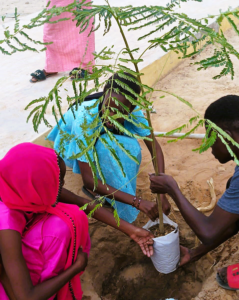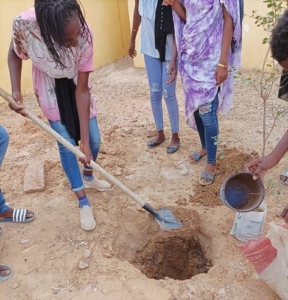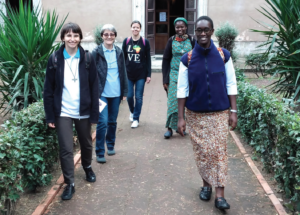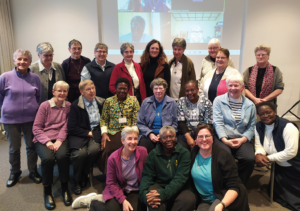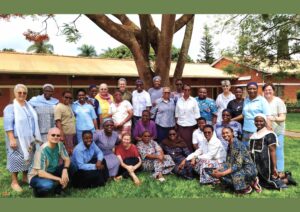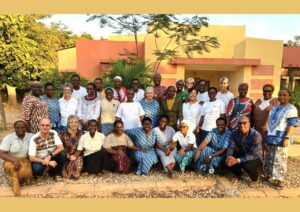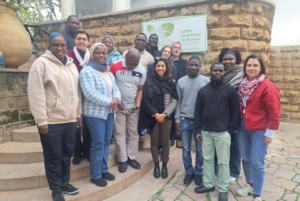Sr Marie Ange, in Nouakchott, Mauritania, joins on a mission to bring trees to schools. Here is her report.
On Thursday, 24 November 2022, I woke up when it was still dark to start the four-hour drive to Boghe. I had a cold and was unable to speak, but my heart was full of life. I wanted to finally realise a project developed for almost a year with three young men from the Association Soleil des Enfants: Yahya, Abdoul and Dawda, who were ready with their backpacks. It was cold that morning. Before we left, we made sure that each of us had a bottle of water as the journey was long. One after the other, the three young people said “Bismillah” “In the name of God” and we set off on a beautiful adventure.
Along the way, they explained why it is important for them to plant trees. They believe that among the good deeds that a living being can do while on this earth is the building of a mosque and the planting of at least one tree. When a person who has built a mosque dies, the mosque continues to receive people who come to pray there and this is a source of blessing and grace for the person who built it. The same is true for the person who planted a tree. When it is hot, people sit under the tree to get some coolness, and in different cultures, families meet under the tree to deal with family problems and reconcile with each other. It is a place of gathering. The person who planted the tree, even if he/she is dead, continues to receive divine graces as a result of the tree’s usefulness.
The planting of trees and all activities related to creation strongly unites us Christians and Muslims. We are all called to take care of the environment regardless of our religion.
We arrived at the Bababé school in Boghé at about 2.30 pm. The headmaster of the school came to welcome us with great joy. When he saw the fifty trees, he exclaimed: “Allah Akbar, during the planting of the trees you saw along the road, I had asked for only three trees, but they gave me nothing and now you are bringing us fifty trees, thank you very much. We will take care of them, you will not regret it.”
The enthusiastic boys and girls started adding manure to the holes, each one wanted to plant a tree. Within minutes, in the school yard, 30 trees were planted and watered. It was already green. What a change!
I was reminded of a song by Jean Claude Giannada which says: “It only takes one tear to make the world cry, one song to make it dance, one hand in another hand to begin the circle, and if we are two, why not thousands?”
Yahya helped increase our awareness about the role of a tree and its maintenance.
The other twenty trees were reserved for the primary school on the Senegal River. The great joy we felt made us not even feel hungry. We congratulated each other by shaking hands.
The time came to go to the family of the headmaster of the school where we were going to spend the night. We entered his desert taxi, he apologised for its condition and we told him that it was not serious.
When we arrived at his house, we were welcomed in the Pular language “Mbataseli…” and the mother offered us a room, a meal and a small gas cylinder to make Mauritanian tea. We were at home.
After an hour’s rest, we decided to go to the primary school to plant the twenty remaining trees. We transported them with a cart. The little children were running around, curious about the trees. They wanted to know the name of each tree. We told them about the benefits of trees and their responsibility to take care of them. In the evening, around 9pm, a crier was sent to all the houses announcing: “Tomorrow you are invited to come to school with scissors to build protections for the trees.”
My fellow travellers went to watch a game and I stayed with the mother and her two daughters. They only spoke Pular and I only spoke French. But as we wanted to communicate, every word was accompanied by a gesture and a smile, looking into each other’s eyes so as to understand each other. Their attention to me and their thoughtfulness, wanting to reassure themselves that I was comfortable, that I had eaten well and that I was going to sleep well, was extraordinary.
I was confirmed in what Cardinal Lavigerie, our founder, used to tell us: “To learn the language of a people is to prepare to belong to it”. Every day I face this challenge and I believe that it is time to learn their language for a more effective mission.
The children do not have books and even those in secondary school express themselves better in Pular than in French. Sending them books would be a wonderful gift for them.
Deep inside, I felt that we are brothers and sisters. Let us dare to go towards others and build a fraternal world together.
Sr Marie Ange Ndayishimiye, community of Nouackchott (Mauritania)



